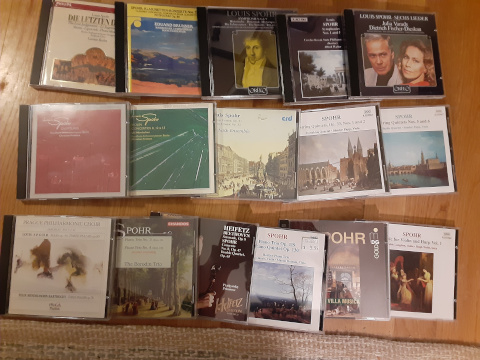This post is something new. I’m thinking of making blog posts on classical music a regular feature here, for no better reason than that I love it. Liberty Fund has published several articles I’ve written on classical composers. If computer security expert Bruce Schneier can devote a post every Friday to squid, I think I can diversify too. I’ve added a WordPress category, “Music,” for these posts.
Here I’d like to talk about some composers whom I like but aren’t currently as well-known as the regulars on concert programs. The idea for this came when I learned that Vivaldi was known only to a few in the nineteenth century. He came to prominence, oddly, because of a piece which Fritz Kreisler wrote himself but attributed to Vivaldi. On the other side of the ledger, Louis Spohr and Joseph Joachim Raff were among the top-ranked composers of the nineteenth century but aren’t heard very much today.
 In 1843, a review in Musical World said of Spohr, “His writings take their station among the master-pieces of Bach, Handel, Gluck, Haydn, Mozart, Beethoven, Weber, and Cherubini.” Around 1875, the famous conductor Walter Damrosch wrote to Raff that “we’re overrun with Raff here; your symphonies and chamber music are as well known here as anything by Beethoven.” Unless you’ve dug deeply into nineteenth-century music, you may never have heard of either of them.
In 1843, a review in Musical World said of Spohr, “His writings take their station among the master-pieces of Bach, Handel, Gluck, Haydn, Mozart, Beethoven, Weber, and Cherubini.” Around 1875, the famous conductor Walter Damrosch wrote to Raff that “we’re overrun with Raff here; your symphonies and chamber music are as well known here as anything by Beethoven.” Unless you’ve dug deeply into nineteenth-century music, you may never have heard of either of them.
J. S. Bach wasn’t very well-known in the early nineteenth century until Felix Mendelssohn pushed hard to revive his works. Before that, when people said “Bach,” they usually meant his son, Carl Philipp Emanuel. Today it’s C.P.E. who’s relatively obscure.
The point is that fame and greatness aren’t the same thing. If they were, the pantheon of composers would be more stable. How well-known a composer has been often depends on who was championing the composer.
Let’s look a bit more at Spohr and Raff. Spohr is one of my favorites; I’ll listen to his music as gladly as Schumann’s or Weber’s. My Spohr CDs might well be the biggest personal collection in New Hampshire. His problem may be that he outlived his best years; his earlier works are generally more interesting than his later ones. I like all of his first five symphonies. The Sixth is a bit odd, and I don’t often listen to the Seventh, Eighth, and Ninth. He wrote a Tenth Symphony but withdrew it because he was dissatisfied with it. His music owes a lot to Mozart while conveying the Romanticism of the first half of the nineteenth century.
Much of his chamber music is worth hearing. Favorites of mine include the Quintet for piano and winds, Opus 52, the Nonet for strings and winds, Opus 31, and the Fantasia for harp, Opus 35. Spohr played violin and his wife played harp, and his music for this combination often feels especially personal. I enjoy his oratorio Die letzten Dinge (the last judgment), which whips up a powerful end of the world. His opera Jessonda is worth a listen in spite of its dated colonial theme. I was unimpressed with a recording of his Faust, though the problem may have been with the production rather than the opera.
I haven’t gotten as deeply into Raff, but he wrote music that should be performed more often. It shows Mendelssohn’s influence, but it’s more free-wheeling. His best-known works include the Third and Fifth symphonies and the Piano Concerto. The “Lenore” symphony. No. 5, is a nice spooky piece based on the poem “Lenore” by Gottfried August Bürger. The last movement is a wild ride with a ghostly horseman. The Third Symphony doesn’t appeal to me as much; I prefer the Fourth, which has a cyclic form (the initial theme of the first movement recurs in the last) and a slow movement which is a passacaglia of sorts. I like the Seventh, “In den Alpen,” for its last movement, which depicts a Swiss outdoor festival, even if the first movement is long and diffuse.
There are a lot of composers worth hearing beyond the famous names that constantly appear on concert programs and the avant-garde composers who get sandwiched between the big names. With YouTube, Spotify, and other streaming services (alas, Primephonic is gone), you can sample them at no cost and decide which ones you like.
Going by yesterday’s view count, this was an experiment not worth repeating.
I think it’s very worth repeating, I always love learning about music I was not aware of.
Raff is lovely! Did you know that Jon Anderson “quoted” a bit of Raff’s Im Winter on his Animation album?